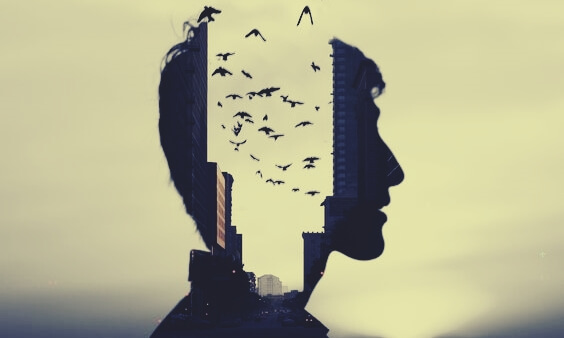Should I Stay or Should I Go?


Written and verified by the psychologist Valeria Sabater
Should I stay or should I go? Few existential crossroads make us feel so much doubt, so much fear. We know that sometimes, to stay would be to take it too far, and to go would mean to get back to your true self. However, this rule of thumb might not work in all cases. So how do you know what the right decision is?
We would all love to be able to always make the right decision; to be infallible, precise, and impeccable with each step we take. Unfortunately, no matter how much we want it, nobody arrives in this world with a perfectly calibrated compass that can guide them through life. But that’s our true greatness, the true adventure of living – creating our own path based on trial and error.
The only mistake we can really make is not making decisions, letting chance take the reins, abandoning what little control we have. If we stay stuck in our fear, we’ll become immobile, like rusted ships on the shore of life. However, people who can choose one direction over another will be able to learn from that decision, which is the most important thing of all.
“It is very likely that the best decisions are not the product of reflection in the mind, but the result of an emotion.”
-Eduard Punset-

To stay or not to stay – choosing one doesn’t always mean you renounce the other
People are pushed to make decisions almost constantly. We choose whether to drive or take public transport, drink tea or coffee, stay at a friend’s house or go home, save a little more this month or satisfy our more immediate desires. These banal decisions don’t take much effort because in general, we don’t really have anything to lose.
The decisions with more emotional weight are the ones that make us feel like we could throw ourselves off balance. Whether to leave your partner or not, whether to quit your job and find another, whether to move abroad and start a new chapter… Decisions like these trigger what psychologists call loss aversion. It’s almost like they activate an alarm within us, warning us of an impending danger that we’re not prepared for.
So when you ask yourself “should I stay or should I go?” it would help to understand a few things first:
- Making a decision should not be synonymous with loss or resignation – it should result in a gain. For example, if you quit your job where you felt fulfilled to find another one with a better salary but less personal satisfaction, it will probably be a personal loss.

- Another example – if you choose to give your partner another chance, to stay and stretch out the almost impossible relationship a little longer, it will be a loss because you’re hurting yourself. Don’t forget that holding on can be much more painful than letting go.
Therefore, it would be smart to try and make sense of each possible decision and orient yourself within it. Whether you stay or go, it must be to invest in yourself and work towards your own happiness. This is a decision that only you can make, because nobody else can walk in your shoes or know exactly what you’re going through. In most cases, you have the deepest knowledge of your own needs.
The answer is within you
Sometimes, you overthink this question so much that everything starts to get foggy. As a result, your quality of life goes down and worst of all, the anxiety and doubt starts to manifest in physical symptoms, such as:
- Insomnia.
- Digestive problems.
- Headaches.
- Body ahes and pains.
- Mood swings.
- Heart palpitations.
- Difficulty concentrating.
When your mind can’t calm down, it gets out of sync with your body, and then you develop physical imbalances. This is a clear sign that you have a serious problem to resolve. In order to confront the situation in the best way possible, here are a few suggestions to reflect on:

Two components of a good decision
You’ve probably heard it said a lot that the best answer is always within you. Finding it is a courageous act of self-exploration that can be done by following the problem-solving model of Thomas D’Zurilla and Marvin Goldfried. It’s a simple yet inspiring theory that requires you to follow two major steps:
- Assume a brave and positive attitude. When confronting a problem, attitude is everything. Recall what we said at the beginning about directing all of your actions towards personal gain. Making a decision does not mean you have to lose anything. There should always be an added value, a clear incentive for your happiness and inner balance.
- Reformulate your life. There always comes a time when there’s no other option than to reinvent yourself, rewrite your story, take a step further to keep advancing, but come out a bit stronger, newer, almost glowing.
So when faced with the eternal question “should I stay or should I go,” know that there’s not always one correct answer. It’s not like one path is made of golden bricks, and the other of spiky thorns. You can make the most of the one you choose if you’re clear about your priorities. Through your own effort, you can shape your reality to be more satisfying.
In the end, we all choose our own paths.
Should I stay or should I go? Few existential crossroads make us feel so much doubt, so much fear. We know that sometimes, to stay would be to take it too far, and to go would mean to get back to your true self. However, this rule of thumb might not work in all cases. So how do you know what the right decision is?
We would all love to be able to always make the right decision; to be infallible, precise, and impeccable with each step we take. Unfortunately, no matter how much we want it, nobody arrives in this world with a perfectly calibrated compass that can guide them through life. But that’s our true greatness, the true adventure of living – creating our own path based on trial and error.
The only mistake we can really make is not making decisions, letting chance take the reins, abandoning what little control we have. If we stay stuck in our fear, we’ll become immobile, like rusted ships on the shore of life. However, people who can choose one direction over another will be able to learn from that decision, which is the most important thing of all.
“It is very likely that the best decisions are not the product of reflection in the mind, but the result of an emotion.”
-Eduard Punset-

To stay or not to stay – choosing one doesn’t always mean you renounce the other
People are pushed to make decisions almost constantly. We choose whether to drive or take public transport, drink tea or coffee, stay at a friend’s house or go home, save a little more this month or satisfy our more immediate desires. These banal decisions don’t take much effort because in general, we don’t really have anything to lose.
The decisions with more emotional weight are the ones that make us feel like we could throw ourselves off balance. Whether to leave your partner or not, whether to quit your job and find another, whether to move abroad and start a new chapter… Decisions like these trigger what psychologists call loss aversion. It’s almost like they activate an alarm within us, warning us of an impending danger that we’re not prepared for.
So when you ask yourself “should I stay or should I go?” it would help to understand a few things first:
- Making a decision should not be synonymous with loss or resignation – it should result in a gain. For example, if you quit your job where you felt fulfilled to find another one with a better salary but less personal satisfaction, it will probably be a personal loss.

- Another example – if you choose to give your partner another chance, to stay and stretch out the almost impossible relationship a little longer, it will be a loss because you’re hurting yourself. Don’t forget that holding on can be much more painful than letting go.
Therefore, it would be smart to try and make sense of each possible decision and orient yourself within it. Whether you stay or go, it must be to invest in yourself and work towards your own happiness. This is a decision that only you can make, because nobody else can walk in your shoes or know exactly what you’re going through. In most cases, you have the deepest knowledge of your own needs.
The answer is within you
Sometimes, you overthink this question so much that everything starts to get foggy. As a result, your quality of life goes down and worst of all, the anxiety and doubt starts to manifest in physical symptoms, such as:
- Insomnia.
- Digestive problems.
- Headaches.
- Body ahes and pains.
- Mood swings.
- Heart palpitations.
- Difficulty concentrating.
When your mind can’t calm down, it gets out of sync with your body, and then you develop physical imbalances. This is a clear sign that you have a serious problem to resolve. In order to confront the situation in the best way possible, here are a few suggestions to reflect on:

Two components of a good decision
You’ve probably heard it said a lot that the best answer is always within you. Finding it is a courageous act of self-exploration that can be done by following the problem-solving model of Thomas D’Zurilla and Marvin Goldfried. It’s a simple yet inspiring theory that requires you to follow two major steps:
- Assume a brave and positive attitude. When confronting a problem, attitude is everything. Recall what we said at the beginning about directing all of your actions towards personal gain. Making a decision does not mean you have to lose anything. There should always be an added value, a clear incentive for your happiness and inner balance.
- Reformulate your life. There always comes a time when there’s no other option than to reinvent yourself, rewrite your story, take a step further to keep advancing, but come out a bit stronger, newer, almost glowing.
So when faced with the eternal question “should I stay or should I go,” know that there’s not always one correct answer. It’s not like one path is made of golden bricks, and the other of spiky thorns. You can make the most of the one you choose if you’re clear about your priorities. Through your own effort, you can shape your reality to be more satisfying.
In the end, we all choose our own paths.
This text is provided for informational purposes only and does not replace consultation with a professional. If in doubt, consult your specialist.







